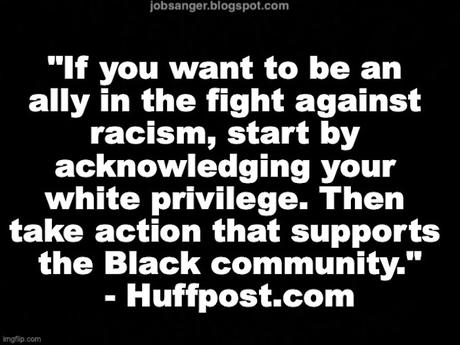
The following is
part of an article by Kelsey Borresen at Huffpost.com:
White people typically move through life unaware of all the head starts, resources and access the color of their skin affords them. They don’t recognize these unearned advantages until they’re pointed out — and even then, some white people will try to deny the existence of their privilege. . . .
We talked to educators, activists, therapists and professors about the things white people often say that highlight their privilege without them realizing it.
1. “It’s not my job to fix racism because I’m not racist.”
What you’re essentially saying is that because the systemic racism doesn’t hurt you personally — a privileged position to be in — you don’t need to be involved in the fight against it. White people must step up to the plate, act as allies and use their privilege for good.2. “I don’t see color.”
The intent behind this statement is to demonstrate that you’re not a prejudiced person. But, as psychologist Erlanger Turner put it, “we all see racial difference unless we’re visually impaired.” Refusing to acknowledge the color of someone’s skin is also a refusal to acknowledge the struggles they’ve endured and discrimination they’ve faced because of their race.3. “There’s no need to worry about the police if you’re not doing anything illegal.”
The way white people perceive and interact with law enforcement is far different from the way Black and Latino people do. Black people have been killed by police while doing everyday activities: Botham Jean was eating ice cream in his living room, Breonna Taylor was sleeping in her bed and Atatiana Jefferson was playing video games with her nephew,just to name a few. There’s also a history of police disproportionately pulling over,stoppingand arresting Black people over minor infractions or for no apparent reason. And, as was the case with George Floyd — the Minneapolis man who was killed in police custody after allegedly buying cigarettes with a counterfeit $20 bill — even minor incidents can escalate into deadly violence.4. “I don’t want to post about racism on social media because I’m scared of the backlash.”
It is a privilege to not have to take a risk of alienating yourself from others. It’s saying that the drama or backlash you don’t want to face from potential racists is more important than speaking out against innocent people being oppressed.5. “I don’t have white privilege.”
Some white folks insist white privilege doesn’t apply to them because they’re not wealthy or because they’ve worked hard for what they have or because their life has been a struggle in any number of ways. They get defensive when they hear the term because they don’t really understand it. White privilege doesn’t mean all white people live charmed lives.6. “I’m not sure when I should start talking to my kids about racism.”
One of the most common concerns Hill hears from white moms is not knowing when or how they should broach the subject of racism with their children. The question itself demonstrates that white parents have the ability to wait for the “right” time to talk to their kids about racial discrimination; Parents of color are often forced into having those conversations with their kids at a young age.
 The following is part of an article by Kelsey Borresen at Huffpost.com:
The following is part of an article by Kelsey Borresen at Huffpost.com: 
